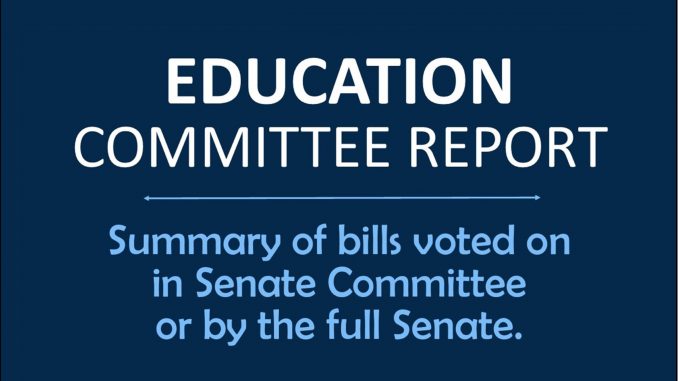Education Committee – Week 5, 2022

SF 2130 – Student Aid Commission registration technical changes
SF 2130 is a departmental bill from the College Student Aid Commission that makes technical changes to remove exception language that was intended for Iowa-originating schools that are no longer relevant. The bill requires the tuition refund policy for Iowa resident students of a for-profit school to comply with current standards for refund policies and penalties for violating those standards. A violation is a simple misdemeanor.
Under current law, these requirements do not apply to Hamilton Technical College, which was intended to be exempted from registration as an Iowa-originating school owned by the family founders. However, the Hamilton family sold the school to an out-of-state educational corporation, Orion Education, in late 2018, so it should no longer qualify for an exemption. The bill also strikes the registration exemption for INSTE Bible College since it intentionally allowed its U.S. Department of Education-recognized accreditation to lapse. [2/9: 46-0 (Absent: Carlin, Dawson, Johnson, Sinclair)]
SF 2197 – Task force on special education students in nonpublic school settings
SF 2197 originally required special education services be provided on the nonpublic school premises, if the parents or guardian of the student receiving the services wanted the services provided at the nonpublic school. According to the Iowa Department of Education (DE), this would run contrary to federal law. The committee adopted an amendment that changes this bill to a task force. The Department will convene a special education task force to study and make recommendations regarding how to better serve students at nonpublic schools who receive special education services, especially those in rural areas. [2/9: 46-0 (Absent: Carlin, Dawson, Johnson, Sinclair)]
SF 2205/SSB 3079 – Enumerated list of parent/guardian knowledge on child’s curriculum
SF 2205 enumerates the mostly current policy and practices regarding a parents’ ability to get information about their child’s education. The bill also says that the school district must not require any student to engage in any activity, including instruction or any test, assessment or other means of evaluation that involves obscene material without the express prior written consent of the student’s parent or guardian. It also says the school district must not allow a minor child to access obscene material in a classroom or to check out obscene material from a library without the express prior written consent of the minor child’s parent or guardian.
A lot of the so-called “rights” enumerated in this bill are already guaranteed by various laws, policies or practices. For example, courts already have found that parents have broad authority when it comes to deciding how to educate their children. The Family Educational Rights and Privacy Act guarantees parents the right to inspect their child’s educational records at school and to request updates and corrections. The Every Student Succeeds Act allows parents to refuse standardized testing. Students can already opt out of sex education classes if their parents request an exemption in writing or petition the principal. Iowa schools already provide a comprehensive list of books available in libraries online and accessible to the public. Finally, there are already Iowa school board protocols to provide for a requested review of curriculum or books.
The committee adopted an amendment to modify the definition of obscene material with “sexually explicit.” This is something that needs to be more clearly defined before the bill is ready for floor debate. The amendment also makes changes to what parents can opt their child into versus current practice of opting out of certain curriculum. [2/3: Short Form]
SF 2204/SSB 3090 – Basic School Aid for FY23 public schools in Iowa
SF 2204 is the basic school aid proposal by Senate Republicans. It increases State Supplemental Aid (SSA) to Iowa’s public schools by 2.25% over the previous year. This a total state cost per pupil of $7,400, an increase of $173 per student. The net impact is $162 million in state funds to schools.
However, the actual cost of this proposal to the state is only $103.7 million. Last year’s Republican tax bill requires $60 million of total funding to replace the commercial and industrial backfill. Additionally, Republicans have said they are factoring in an additional $15 million cut to AEAs, which would make the real increase to Iowa public schools in this bill $88.7 million.
There are 84 school districts that won’t get new money under this bill because their enrollments have dropped more than 2.25% funding increases can offset.
The proposal includes an additional $10 in per-pupil equity, but for 100 schools this is not additional funding; it’s property tax relief. The bill also continues the practice of using state funds to pay for the local portion of the 2.25% increase, which holds down property taxes but doesn’t provide additional funding for public schools.
Senate Republicans include a rate increase for transportation equity, but because 2.25% is not enough to get to the statewide average for transportation costs, an additional estimated $2 million is included in this bill. The bill continues an additional appropriation “in an amount necessary to make all transportation equity aid payments.” [2/3: 10-5]
Legal Disclaimer:
EIN Presswire provides this news content "as is" without warranty of any kind. We do not accept any responsibility or liability for the accuracy, content, images, videos, licenses, completeness, legality, or reliability of the information contained in this article. If you have any complaints or copyright issues related to this article, kindly contact the author above.
